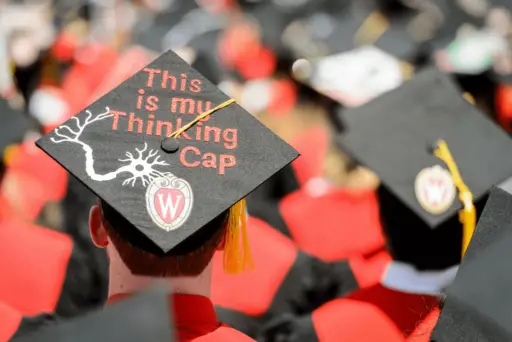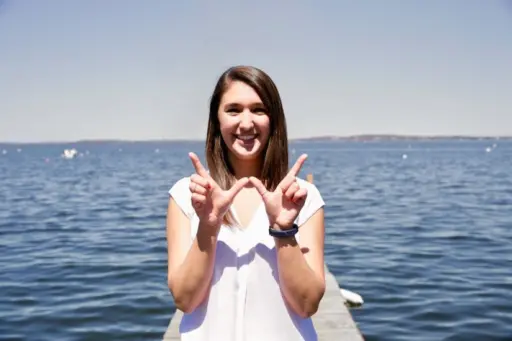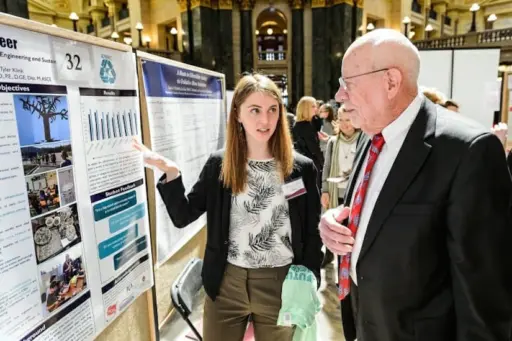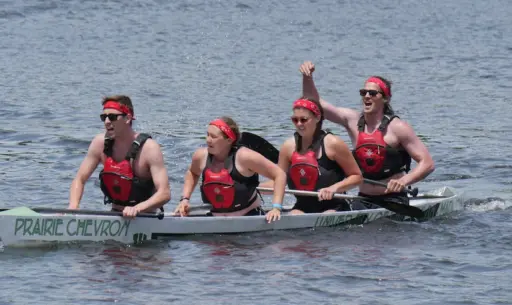
Undergraduate students in the University of Wisconsin-Madison College of Engineering 3D print prototypes in the college makerspace, the Grainger Engineering Design Innovation Laboratory. They run virtual reality simulations in the Kohler Innovation Visualization Studio. They sand, saw and weld in the Technical Education and Manufacturing Lab.
They enhance their classroom education by going out and doing things. By making things. By solving problems. Making a difference.
We prepare our undergraduates to flourish after they leave campus by presenting them with an abundance of opportunities to shape their career paths through, for example:
- Student organizations that build Hyperloop pods and race cars, travel across the world to deliver clean water to communities in need, and connect students with industry leaders
- Events that encourage entrepreneurial ingenuity, unearth new energy-saving solutions, and share the thrills of engineering with young people
- Internships and cooperative work opportunities that provide tangible, on-the-job experience and build professional relationships
Read some recent examples of how undergraduates at the UW-Madison College of Engineering are excelling:
Top scholars
Chemical engineering junior Nathan Wang does it all: He’s an outstanding student, already has several years’ worth of research under his belt, and is an active volunteer and member of the campus community. He’s an astronaut scholar … and now can add Goldwater Scholar to that list, too.
 Maddie Kothe
Maddie Kothe
Maddie Kothe took a chance on her engineering mechanics and astronautics major at the suggestion of a roommate. Now, thanks to her UW-Madison education, the sky is not the limit: In summer 2018, the Brooke Owens Fellow will work for manufacturer Made in Space before beginning graduate study in aerospace engineering at Stanford University. Elsewhere in the solar system, undergrad Max Goldberg will spend summer 2018 advancing his dream of helping humanity reap the benefits of outer space travel when he embarks on two overlapping internships with Strike Force, a leading-edge commercial spaceflight company.
Sometimes, students’ path through school bumps and winds around before it finally straightens out. That’s the case for returning adult Chance Cork, who grew up on the street and in foster care, started college, dropped out, returned to school, overcame a learning disability, and graduated in 2018 with a bachelor’s degree in materials science and engineering.
In Mechanical Engineering Assistant Professor Peter Adamczyk’s intro to robotics course, students don’t just learn. They do robotics, they learn from what didn’t go as planned, and they build some unique robotic systems of their own.
Excellent in research
 Morgan Sanger explains her group’s research to Wisconsin state Sen. Fred Risser.
Morgan Sanger explains her group’s research to Wisconsin state Sen. Fred Risser.
Electrical engineering undergrad Yuchen Gu is studying how RFID can make smart, interconnected cities a reality in the not-so-distant future. In April, he competed in the IEEE Educational Megachallenge in Orlando, Florida, where he showcased a system to improve traffic safety that incorporates RFID reflectors on bicycles and pedestrians.
In their research, a team of geological engineering undergrads is focusing on the benefits of a method of highway resurfacing called cold-in-place recycling. Call it groundbreaking, environmentally friendly and cost-effective.
In recognition of the thoughtful, polished way in which they communicated their research, a team of materials science and engineering undergrads took top honors for their poster during an ASM-International seminar sponsored by the Milwaukee chapter of ASM. At the American Society for Biochemistry and Molecular Biology annual meeting, biomedical engineering undergrad Will Flanigan won a best poster award for his research.
Innovating in every way
Lots of top-grossing companies got their start in somebody’s garage. Today, young entrepreneurs are realizing their world-changing ideas on college campuses like UW-Madison, thanks to an ecosystem that encourages innovation and collaboration.
 UW-Madison students raced for a chance to win “America’s Cup of Civil Engineering” at the 30th National Concrete Canoe Competition in Golden, Colorado, in June 2017. They’ll put a new and improved boat to the test again in 2018.
UW-Madison students raced for a chance to win “America’s Cup of Civil Engineering” at the 30th National Concrete Canoe Competition in Golden, Colorado, in June 2017. They’ll put a new and improved boat to the test again in 2018.
In an opportunity to help NASA understand the complicated life of comets, a group of enterprising undergrads collaborated on an effort to prove they could return a comet nucleus sample safely to earth. How? They cast a comet capsule in the college foundry.
Well-rounded engineers also are articulate communicators. Freshman Isabella Lenz exemplifies that skill: She earned first place and a $1,000 scholarship in our annual Steuber Prize for Excellence in First-Year Writing competition.
Our student experience includes the opportunity to participate in scores of engineering student organizations ranging from academic and professional to social and competitive. Wisconsin Racing is among those orgs, and it recently rolled out sweet new internal combustion and electric Formula vehicles for its upcoming races, while our nationally competitive Concrete Canoe team once again will compete … nationally. Our Clean Snowmobile Team earned third place in the 2018 SAE International competition, and for the third year, our Badgerloop team will participate in Elon Musk’s Hyperloop competition. After earning back-to-back innovation awards, members hope the third time is a charm. If their sleek new pod is any indication, there’s reason to feel optimistic.
Want to jump the line at a hot nightclub, more easily administer insulin injections to hard-to-reach areas, or quickly identify what bacteria are in your water or food? Many engineering students develop unique products or services and start running their own companies before they even graduate. They also top campus, state and national innovation or business plan competitions, including the Wisconsin Governor’s Business Plan Contest, Transcend Engineering, and a business plan competition sponsored by the Wisconsin School of Business.
Leveraging our fantastic new makerspace, students who participated in our first (and wildly successful) energy hackathon spent a weekend developing everything from smartphone apps to home sensor networks that might help people make more sustainable energy choices.
An interdisciplinary group of our undergraduates has become “solar ambassadors,” and in partnership with the San Francisco nonprofit Re-volv, is helping to crowdfund the cost of installing solar panels on the roof of a Madison-area nonprofit service agency.